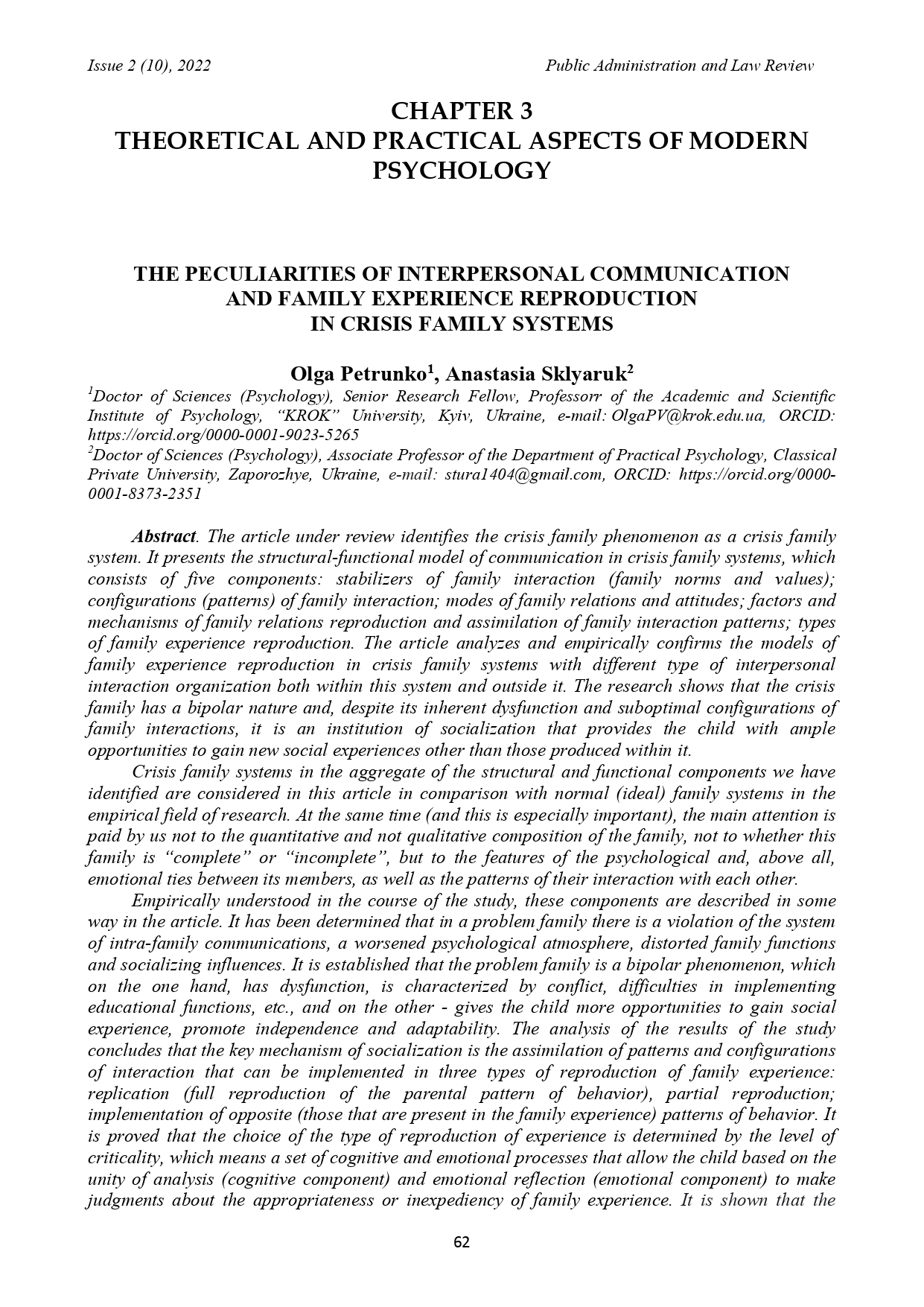THE PECULIARITIES OF INTERPERSONAL COMMUNICATION AND FAMILY EXPERIENCE REPRODUCTION IN CRISIS FAMILY SYSTEMS
DOI:
https://doi.org/10.36690/2674-5216-2022-2-62Keywords:
crisis family systems, configurations of family сommunication, replication of family experience, socialization in crisis family systemsAbstract
The article under review identifies the crisis family phenomenon as a crisis family system. It presents the structural-functional model of communication in crisis family systems, which consists of five components: stabilizers of family interaction (family norms and values); configurations (patterns) of family interaction; modes of family relations and attitudes; factors and mechanisms of family relations reproduction and assimilation of family interaction patterns; types of family experience reproduction. The article analyzes and empirically confirms the models of family experience reproduction in crisis family systems with different type of interpersonal interaction organization both within this system and outside it. The research shows that the crisis family has a bipolar nature and, despite its inherent dysfunction and suboptimal configurations of family interactions, it is an institution of socialization that provides the child with ample opportunities to gain new social experiences other than those produced within it.
Crisis family systems in the aggregate of the structural and functional components we have identified are considered in this article in comparison with normal (ideal) family systems in the empirical field of research. At the same time the main attention is paid by us not to the quantitative and not qualitative composition of the family, not to whether this family is “complete” or “incomplete”, but to the features of the psychological and, above all, emotional ties between its members, as well as the patterns of their interaction with each other. Empirically understood in the course of the study, these components are described in some way in the article. It has been determined that in a problem family there is a violation of the system of intra-family communications, a worsened psychological atmosphere, distorted family functions and socializing influences. It is established that the problem family is a bipolar phenomenon, which on the one hand, has dysfunction, is characterized by conflict, difficulties in implementing educational functions, etc., and on the other - gives the child more opportunities to gain social experience, promote independence and adaptability. The analysis of the results of the study concludes that the key mechanism of socialization is the assimilation of patterns and configurations of interaction that can be implemented in three types of reproduction of family experience: replication (full reproduction of the parental pattern of behavior), partial reproduction; implementation of opposite (those that are present in the family experience) patterns of behavior. It is proved that the choice of the type of reproduction of experience is determined by the level of criticality, which means a set of cognitive and emotional processes that allow the child based on the unity of analysis (cognitive component) and emotional reflection (emotional component) to make judgments about the appropriateness or inexpediency of family experience. It is shown the crisis family has a bipolar nature and despite its inherent dysfunction and suboptimal configurations of family interactions, it is an institution of socialization, which not only gives the child an "ideal" family experience, but also creates opportunities for alternative social experiences. different from produced within a particular family system.
Downloads
References
Agllias, K. (2017). Missing family: the adult child’s experience of parental estrangement. Journal of Social Work Practice, 32(1), 59–72. https://doi.org/10.1080/02650533.2017.1326471
Allen, J., & Moore, J. (2016). Troubling the Functional/Dysfunctional Family Binary Through the Articulation of Functional Family Estrangement. Western Journal of Communication, 81(3), 281–299. https://doi.org/10.1080/10570314.2016.1250156
Broderick, C. B. (1993). Understanding Family Process: Basics of Family Systems Theory (1st ed.). SAGE Publications, Inc.
Camisasca, E., Miragoli, S., & Di Blasio, P. (2019). Children’s cognitive and emotional processes in adult versus child-related inter-parental conflicts. Europe’s Journal of Psychology, 15(4), 843–857. https://doi.org/10.5964/ejop.v15i4.1613
Gehring, T. M., Debry, M., & Smith, P. K. (2001). The Family System Test Fast: theory and application. Brunner-Routledge.
Kon, I. (1988) The Child and Society: A Historical and Ethnographic Perspective. Moskva: Nauka Publishing House.
Mead, G. H., & Morris, C. W. (1967). Mind, Self, and Society from the Standpoint of a Social Behaviorist (Works of George Herbert Mead, Vol. 1). The University of Chicago Press.
Mead, M., & Wolfenstein, M. (1955). Childhood in Contemporary Cultures. Chicago: The University of Chicago Press.
Moskalenko, V. (2009). Peculiarities of the study of personality socialization in the intersubjective paradigm. Social Psychology. 5 (37). 35-48.
Petrunko, O. (2010). Children and media: socialization in an aggressive media environment. Poltava: Ukrpromtorservis.
Siedykh, K. (2017). Family psychology. Kyiv: Academy.
Skinner, B. F. (1965). Science And Human Behavior (New Impression ed.). Free Press.
Skliaruk, A. (2018). Troubled family as an environment of child socialization. Kherson: Helvetica Publishing House.

Downloads
Published
How to Cite
Issue
Section
License
Copyright (c) 2022 Оlgа Petrunkо, Anastasia Sklyaruk

This work is licensed under a Creative Commons Attribution-NonCommercial-NoDerivatives 4.0 International License.





